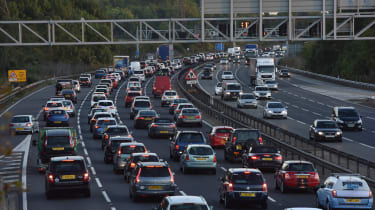Car insurance shake up: new rules proposed to protect drivers
EU Directive proposes universal insurance history system across continent, plus increased powers to combat uninsured drivers

The car insurance industry is set for a shake up after the EU unveiled new proposals that aim to provide greater protection for consumers, and increased standardisation across the industry.
The rules, if approved, would apply to all EU countries, standardising the format and application of insurance histories, as well as setting minimum levels of cover.
Announcing the proposals, Jyrki Katainen, the European Commission’s vice-president for jobs, growth, investment and competitiveness, said the Motor Vehicle Insurance Directive would ensure the “smooth functioning” of the insurance industry “for the benefit of drivers and potential victims of motor vehicle accidents.”
• Best car insurance companies
The five proposals were announced by the European Commission are as follows:
1. Insolvency of an insurer: if an insurance company goes bust, insurance policies will still pay out; the UK insurance industry already offers this protection.
2. Claims history statements: insurance histories from all EU member states will be accepted and treated in a universal manner.
3. Uninsured driving: EU states will be given greater powers to combat uninsured drivers, allowing member states to use number plate recognition systems to check the insurance status of cars from other EU countries – something that is currently prohibited as a hindrance to free movement. The checks must “not require stopping the vehicle, and [be] necessary and proportionate”, though.
4. Minimum amounts of cover: will harmonise the minimum levels of cover European Union citizens will experience across the EU, as currently levels differ across member states.
5. Scope: clarifies what “normal use of a motor vehicle” comprises from an insurance perspective, including how claims should be handled for accidents that take place on private land, or in agricultural settings.
The British Insurance Brokers’ Association (BIBA) welcomed some elements of these proposals, but expressed concern universal insurance histories will “create an administrative burden, [and] significant IT system changes”, adding cost to a system that “that already works well in the UK.”
Car insurance providers pledge to stop ‘excessive’ renewal price hikes
The UK’s leading insurance companies previously vowed to stop “excessive” price hikes that “unfairly penalise” drivers renewing their car insurance.
The commitment is intended to bring an end to the practice whereby existing customers are hit with significant price increases at renewal time, forcing them to shop around for other providers or take the hit.
All members of the Association of British Insurers (ABI) and the British Insurance Brokers’ Association (BIBA) - meaning the vast majority of UK insurers – have signed up to a new ‘Guiding Principles and Action Points’ (GPAP) framework. This promises to “address some of the issues in the current market that can lead to excessive differences between new customer premiums and subsequent renewal premiums”.
Competition rules mean the ABI and BIBA will not be able to define what constitutes an “excessive” premium increase, though the organisations say they expect their consumers will see a “marked improvement in outcomes” as the measures are implemented.

The GPAP framework also requires providers to explicitly state that deals for new customers may be lower than subsequent renewals, providing more realistic expectations for consumers.
While the ABI and BIBA are not regulatory bodies, and are therefore unable to take enforcement action against companies not following the framework, the ABI said it welcomed “close scrutiny” from the Financial Conduct Authority (FCA), the body charged with monitoring the insurance industry.
Commenting on the measures, the ABI’s chairman, Andy Briggs said: “The renewal market simply doesn’t work where loyal customers get charged much more than new customers.” Briggs added that as “many consumers expect to get cheaper insurance when they shop around, there is no easy solution”, but he said the new guidelines “demonstrate that the whole industry recognises this is an important issue”.
• Cheapest cars to ensure 2018
BIBA’s chairman, Lord Hunt of Wirral, said the GPAP framework set out a “positive path on renewal pricing”, and that he wanted to encourage the “wider market” to adopt them.
Car, home and travel insurance companies will be obliged to follow the principles, but the framework will not be applicable to health and pet insurers due to the fluctuating, time-sensitive nature such policies make provision for.
The ABI and BIBA will produce a report in “no more than two years’ time” detailing the progress made as a result of the new measures.
UK car insurance prices fall for first time in three years
Car insurance prices have been falling for a full 12 months, the first time such a consistent decrease has been seen in three years, new research has revealed. The average cost of a motor insurance policy currently stands at £768, having fallen by £13 (2 per cent) since the end of 2017's first quarter. Prices fell particularly sharply in the first quarter of 2018, with premiums dropping by £59, or seven per cent.
The youngest drivers have benefited most from the decreasing cost of insurance, with 17-year olds now paying £118 less for cover than they did last year, and £201 (nine per cent) less than they would have paid three months ago. Insurance remains expensive for younger motorists, though, with 18-year olds paying an average of £2,114 per year.
Some drivers have seen insurance increase compared to 12 months ago, though. Insurance for motorists in the Scottish Borders rose by £32 (six per cent), while those in central and north Wales saw cover go up by £10, with an average policy now standing at £629.
The overall reduction in the cost of car insurance is said to be partly due to a forthcoming Government review of the discount rate, used to calculate insurance compensation payouts. A crackdown on fraudulent whiplash claims is also believed to be a factor in the fall.
Louise O'Shea, chief executive at price comparison site Confused.com, which noted the recent fall after analysing its quote index, said: “Finally drivers have had some good news with the end of rising car insurance costs in sight.”
Insurance still remains comparatively expensive, though: Confused.com says drivers are paying an average of £97 more than they were two years ago, and £261 more than they were a decade ago.
UK car insurance market is "dysfunctional" says top insurer
The chief executive of Aviva insurance, Mark Wilson, previoulsy spoke about serious problems in the car insurance market as a whole. Insurers tempting new customers with low offers at the expense of loyal customers is commonplace, which is why he believes the market is "dysfunctional".
• Government to consider £1,200 insurance cap for young drivers
Wilson criticised the industry by saying new customers are tempted by offers that are "too low" which in turn means existing customers have to pay more for their premiums to make up for the loss.
Speaking to BBC's Today Programme, Wilson said: "I think that the UK car insurance market is dysfunctional, I don't think it works properly. The entry level is too low and then it gets put up for all existing customers."
Need car insurance? These are the best providers of 2017/18, as voted by our readers...
Find a car with the experts



